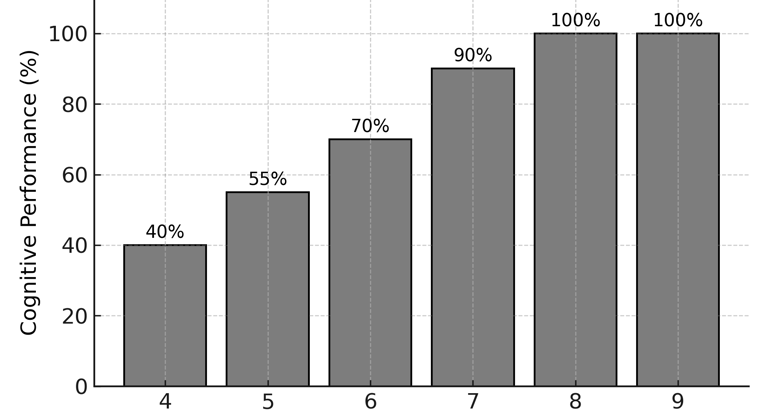Sleep Debt: The Silent Health Killer You’re Probably Ignoring
Think you can “catch up” on lost sleep over the weekend? Think again. Chronic sleep debt is wrecking your brain, hormones, and metabolism — and the effects are more dangerous (and harder to fix) than you think.
REST + RECOVERY
Hank Cramblin
8/11/20252 min read


Sleep Debt: The Silent Health Killer You’re Probably Ignoring 🛌💀
🔥 Why This Matters Right Now
In our hustle-obsessed culture, sleep is treated like a luxury — a “nice to have” when the work is done. But research shows that consistently skimping on sleep creates sleep debt: the accumulated hours of rest you owe your body. And unlike your credit card, this debt charges interest… in the form of brain fog, weight gain, mood swings, and a higher risk of chronic disease.
Sleep Hours Per Night vs. Cognitive Performance, with performance dropping steeply below 7 hours (source: Van Dongen et al., 2003).
⚠️ The Hidden Cost of Sleep Debt
1. Brain Damage on a Micro Level 🧠
Even moderate sleep restriction impairs reaction time, decision-making, and memory consolidation. The scary part? You won’t notice how impaired you are — your brain thinks you’re doing fine while operating like you’re mildly drunk.
Study: After just 2 weeks of sleeping 6 hours/night, cognitive performance drops to the equivalent of 48 hours without sleep. (Source)
2. Hormones Out of Whack ⚖️
Sleep debt throws off your hormonal balance. Cortisol (stress hormone) stays elevated, testosterone dips, and appetite-regulating hormones (leptin and ghrelin) go haywire — making you hungrier and more prone to fat gain.
3. Immune System Suppression 🛡️
Lack of sleep tanks your immune defenses. A study found people sleeping less than 7 hours were three times more likely to catch a cold after virus exposure. (Source)
💡 How to Pay Back Sleep Debt (Without Wrecking Your Schedule)
Step 1: Bank Sleep Proactively
If you know you’ll have a short night ahead, go to bed 30–60 minutes earlier for several nights before. This “sleep banking” can blunt the effects of upcoming deprivation.
Step 2: Use the 2-for-1 Rule
For every hour of lost sleep, aim to recover with two extra hours over the next few days — NOT in one massive weekend sleep binge, which can throw off circadian rhythm.
Step 3: Nap Like a Pro 💤
Power Nap (10–20 min): Boost alertness without grogginess.
Full Cycle Nap (~90 min): Best for recovery if you’ve had several nights of short sleep.
Step 4: Lock In a Non-Negotiable Bedtime
Set an alarm to start winding down, not just to wake up. This trains your body to expect rest at a consistent time, making recovery faster.
The Bottom Line 🚀
You can’t “out-hustle” biology. Chronic sleep debt is like driving your car without oil — you might get away with it for a while, but the damage is happening under the hood. By respecting your body’s need for rest and actively managing your sleep debt, you’re not being “lazy”… you’re future-proofing your brain, metabolism, and mood.
Sleep Debt Effects Over Time (Day 1: mild alertness drop → Day 7: hormonal disruption → Day 14+: chronic inflammation & immune suppression).




